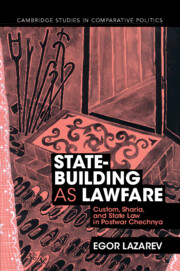Book contents
- State-Building as Lawfare
- Cambridge Studies in Comparative Politics
- State-Building as Lawfare
- Copyright page
- Dedication
- Contents
- Figures and Tables
- Acknowledgments
- Introduction
- Part I Theory and Ethnography
- Part II Lawfare and Political Order
- 3 The Chechen Way
- 4 “There Are No Camels in Chechnya!”
- 5 “We Will Use Every Resource!”
- Part III Lawfare and Social Order
- References
- Index
- Other Books in the Series (continued from page ii)
3 - The Chechen Way
Lawfare under Imperial and Soviet Rule
from Part II - Lawfare and Political Order
Published online by Cambridge University Press: 02 February 2023
- State-Building as Lawfare
- Cambridge Studies in Comparative Politics
- State-Building as Lawfare
- Copyright page
- Dedication
- Contents
- Figures and Tables
- Acknowledgments
- Introduction
- Part I Theory and Ethnography
- Part II Lawfare and Political Order
- 3 The Chechen Way
- 4 “There Are No Camels in Chechnya!”
- 5 “We Will Use Every Resource!”
- Part III Lawfare and Social Order
- References
- Index
- Other Books in the Series (continued from page ii)
Summary
This chapter provides a historical analysis of state-building in Chechnya through the lens of law. It gives an account of the formation and development of legal pluralism under the Russian colonial administration and Soviet rule. The chapter shows that the politics of the imperial and Soviet authorities regarding legal pluralism can be explained by state capacity and ideology. The Russian Empire institutionalized legal pluralism as part of a divide and rule strategy, a response to low state capacity, and an orientalist ideology. When the Empire collapsed in 1917, local actors attempted to mobilize Sharia for competing political projects. Even the Bolsheviks initially built a surprising coalition with religious leaders. Upon the consolidation of Soviet rule, the central government attempted to eliminate legal pluralism in the region. The Soviet drive to ensure legal centralism was fueled by the ideology of modernization and increased state capacity. However, the project ultimately failed because of Stalin’s forced deportation of the entire Chechen nation to Central Asia in 1944. State violence strengthened the Chechen national identity and alienated Chechens from state law. After the return to the Caucasus in 1957, Chechens remained marginalized in the Soviet state-building project and preserved customary and religious institutions.
Keywords
- Type
- Chapter
- Information
- State-Building as LawfareCustom, Sharia, and State Law in Postwar Chechnya, pp. 99 - 118Publisher: Cambridge University PressPrint publication year: 2023

